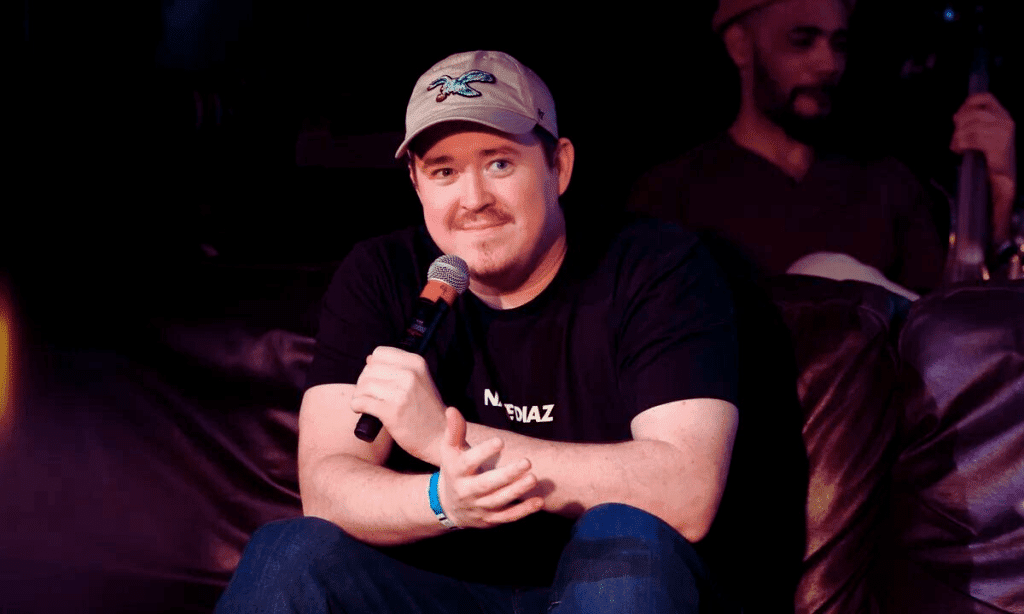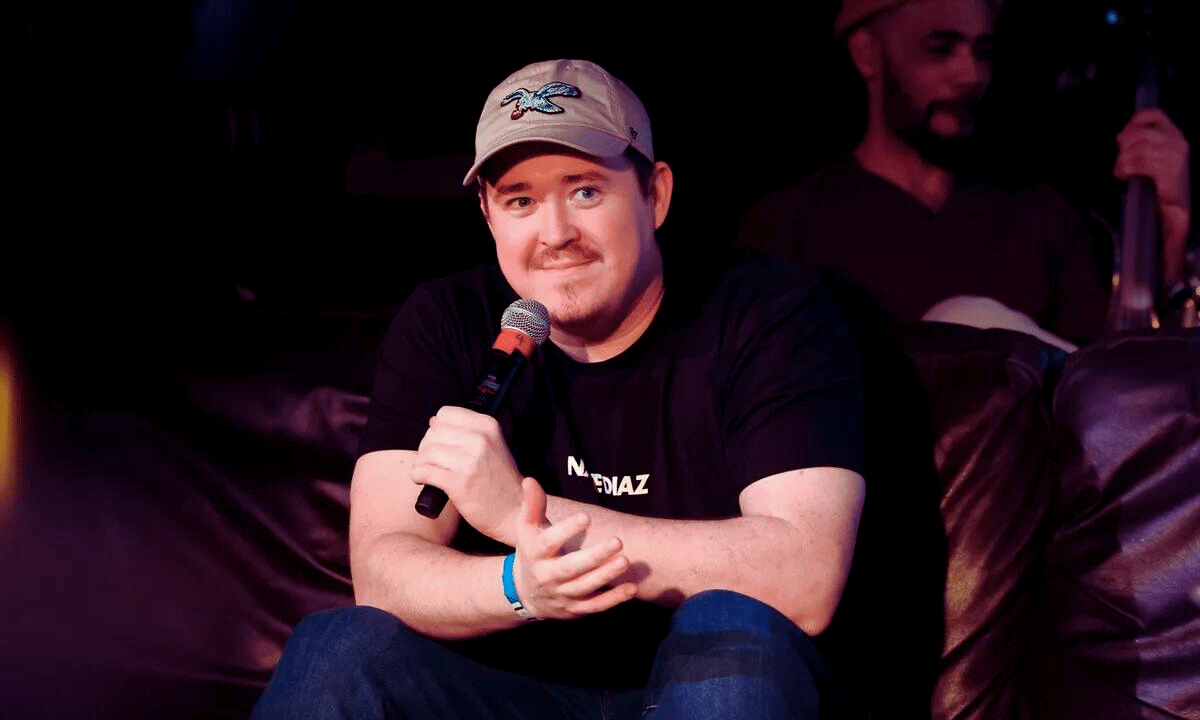“Breaking Down the Brilliance: Shane Gillis’ ‘SNL’ Monologue, a remarkable comedy show in 2024, Unveiled”
Shane Gillis Struggles Alone on ‘Saturday Night Live’ in a Monologue That Avoids Controversy Nearly five years after being fired from “Saturday Night Live” amidst backlash over racist and transphobic jokes, comedian Shane Gillis emerged as confident and brash while hosting the show last night, finding himself somewhat disappointed by his solo act.

Gillis didn’t spend much time joking about the controversy or his comedy career, leading him to return to the show. Just seconds after stepping onto the stage to greet the audience, he said, “Don’t look it up. If you don’t know who I am, please don’t Google it.”
There were no glares or confrontational jokes. Instead, Gillis quickly moved forward, transforming an awkward opening monologue into a series of light jabs. He joked that “every little boy’s best friend is his mom’s gay best friend” and revealed that people with Down syndrome, including relatives, are among the happiest people he knows.
As the monologue progressed, Gillis seemed more and more uncomfortable—even for a comedian whose stage persona is somewhat odd, bordering on foolish. Several times, he joked about hoping for more laughter on a joke, at one point saying, “This place is well-lit. I can see not everyone is enjoying it.” (The room where SNL broadcasts from sometimes amplifies the laughter of home viewers louder than the audience’s response to the performers on stage.)
An Unusual Response
But in some ways, the response to bringing “Saturday Night Live” on as a host was a fantastic answer to the criticism. For viewers familiar with the criticism but not spending time watching podcasts where racist insults, anti-Semitic language, and homophobic/transphobic jokes were omitted, they likely saw Gillis’ monologue and wondered what the fuss was about.
It’s possible that Gillis is attempting something that has become increasingly difficult in the world of media, where every podcast and stand-up routine is recorded and uploaded—speaking to his core audience in a way that’s clearer and more button-pushing than comedy specials on Netflix or SNL.
Or the joke that got the most laughs, where he imagined his niece with Down syndrome being bullied at school by a white kid, and then “a gang of black kids flies in from somewhere and starts curb-stomping that kid.” Why would they do that? And what does race have to do with it? I know—I’m thinking too much. But it felt like giving a lazy excuse to make fun of a white person in the crowd by suggesting that they’re racist.
More of it felt like Gillis trying to distance himself from criticism and avoid any jokes that could reignite backlash. But because he didn’t explicitly address or acknowledge the controversy swirling around his presence, it all felt like a missed opportunity. Or a topic was dodged.
My skepticism extended to other sketches and segments of the show, which often felt like they could have been inspired by the popular jokes on his podcast. There was a sketch where Gillis played the head of a white family who visits a black church in Jamaica, allowing him to use a terrible Jamaican accent for some jokes, and a game show where he played a white person who didn’t recognize Martin Luther King Jr. and Oprah because he was afraid to say their names wrong. (One of his opponents was a white woman who didn’t recognize Mona Lisa or Michelangelo’s David, which was just as bad.)
The Fate of Comedy Rebels
“Saturday Night Live” has established itself as a bastion of comedy rebels, mocking corrupt and incompetent politicians from Richard Nixon to Sarah Palin—in other words, punching up.
But today’s comedy rebels see this plea for comedians to stop hurling insults at marginalized people as putting an end to their free speech—creating successful podcasts, stand-up tours, and more—under the mistaken belief that avoiding racism, sexism, and homophobia/transphobia somehow hampers their comedic prowess. Here, punching down becomes a fair game and quite profitable.
If I think these comedians are saying something new about race, gender, or society, I’ll feel more tolerant of all these things. If they were pushing boundaries to bring new ideas to the table, rather than complaining that they’re not allowed to be uncouth, at least we’d be talking about important comedy concepts.
Breaking Down the Brilliance: Shane Gillis’ ‘SNL’ Monologue, a remarkable comedy show in 2024, Unveiled

Meta Description:
Dive into the brilliance of Shane Gillis’ ‘SNL’ monologue, a standout comedy show in 2024, unveiling its comedic genius and impact on the audience.
Introduction
In the realm of comedy, certain moments stand out, leaving an indelible mark on audiences. Shane Gillis’ ‘SNL’ monologue is one such moment, a comedic masterpiece that captivated viewers in 2024. Let’s dissect the brilliance of this performance, exploring its humor, impact, and cultural significance.
Unveiling Shane Gillis’ ‘SNL’ Monologue
Shane Gillis took the stage at ‘SNL’ with an electrifying presence, immediately captivating the audience with his raw comedic talent and unapologetic humor.
The Opening Act: Gillis’ Entrance
As the curtains parted, Gillis made his entrance with confidence, setting the tone for a memorable performance that would resonate with viewers long after the show ended.
Embracing Controversy: Gillis’ Approach
Gillis fearlessly embraced controversy, using his platform to address taboo topics with wit and irreverence, challenging societal norms, and sparking conversations.
The Heart of the Monologue: Gillis’ Comedy
Gillis‘ comedy struck a chord with audiences, blending sharp observational humor with clever wordplay and unexpected twists, keeping viewers engaged and entertained throughout.
Navigating Sensitive Subjects: Gillis’ Skill
With finesse, Gillis navigated sensitive subjects, delivering punchlines that walked the line between edgy and uproarious, showcasing his comedic prowess and mastery of the craft.
Impact on Pop Culture: Gillis’ Legacy
Gillis‘ ‘SNL’ monologue left an indelible mark on pop culture, inspiring laughter, controversy, and introspection, cementing his status as a comedic trailblazer for generations to come.
The Brilliance Unveiled
Shane‘ ‘SNL’ monologue was more than just a comedy routine; it was a cultural moment that transcended entertainment, sparking dialogue, reflection, and laughter across the globe.
Conclusion

In conclusion, Shane Gillis’ ‘SNL’ monologue represents a shining moment in comedy, blending humor, controversy, and cultural relevance to create a performance that will be remembered for years to come
FAQs
What made Shane Gillis’ ‘SNL’ monologue stand out?
Gillis’ fearless approach to comedy, tackling taboo subjects with wit and irreverence, set his ‘SNL’ monologue apart, captivating audiences and sparking conversations.
Was Shane Gillis’ ‘SNL’ monologue controversial?
Yes, Gillis’ monologue courted controversy for its unapologetic humor and willingness to address sensitive topics, but it also garnered praise for its comedic brilliance.
How did audiences react to Shane Gillis’ ‘SNL’ monologue?
Audience reactions to Gillis’ monologue were mixed, with some praising his boldness and comedic skill, while others criticized the content for its controversial nature.
What is Shane Gillis’ legacy following his ‘SNL’ appearance?
Despite the controversy surrounding his ‘SNL’ stint, Gillis’ legacy endures as a comedic talent unafraid to push boundaries and challenge conventions, leaving an indelible mark on the comedy landscape.
Did Shane Gillis’ ‘SNL’ monologue impact cultural conversations?
Absolutely, Gillis’ monologue sparked meaningful discussions about comedy, censorship, and freedom of speech, highlighting the power of humor to provoke thought and inspire change.
How does Shane Gillis’ ‘SNL’ monologue compare to other comedic performances?
Gillis’ ‘SNL’ monologue stands out for its boldness and originality, carving a unique niche in the annals of comedy history and solidifying his place as a comedic force to be reckoned with.
.

